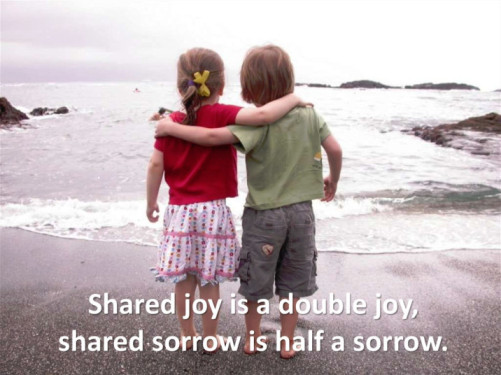The ability to share both our joys and sorrows with others is an essential part of being human. Our emotions are not meant to be experienced alone – sharing them with friends, family, and community is what allows us to truly feel and understand life’s ups and downs. As the old saying goes, “Shared joy is a double joy; shared sorrow is half sorrow.” Let us explore the meaning and truth behind these wise words.
The Power of Shared Joy
When we share good news or moments of happiness with others, it has a multiplying effect. Our joy is magnified by seeing the joy it brings to loved ones. Brain science has shown that experiencing joy with other people engages the brain’s reward centers more strongly than being joyful alone. Having others to celebrate with makes the experience richer and more memorable.
Think back to a time when you received amazing news – perhaps a new job, an engagement, or the birth of a child. How much more impactful was it to be able to share the joyous moment with family and friends? Their delight for you doubled your delight. Laughter and smiles were contagious as joy radiated out from that moment you all shared. Even years later, the memory likely still brings a smile because it was a time of communal happiness.
The Role of Empathy and Support
When individuals share their sorrows with others, they often experience a sense of relief and comfort. This is primarily due to the empathetic responses they receive from those around them. Empathy, the ability to understand and share the feelings of another, plays a crucial role in this process. It allows individuals to feel heard and understood, which can significantly alleviate feelings of isolation and loneliness.
Support systems, whether they are composed of family, friends, or community groups, provide a vital network for individuals dealing with grief. These systems offer not only emotional support but also practical assistance, helping individuals navigate through challenging times. The presence of a supportive community can make a significant difference in how an individual copes with loss and adversity.
Shared Sorrow Lightens the Load
On the other side of the emotional spectrum, having others with whom to share our sorrows makes bearing them much more bearable. When we are struggling with loss, failure, disappointment, or illness, it can feel crushing to endure alone in silence. But opening up to trusted loved ones allows us to receive understanding, compassion, and support that lifts some of the burden from our shoulders.
The Science Behind Shared Sorrow
Research has shown that sharing sorrows or traumas with others engages the parasympathetic nervous system, helping the body relieve stress. Merely talking with a caring listener causes the body to release oxytocin, aka the “love hormone,” which counters anxiety and promotes feelings of safety, trust, and social bonding. Put simply, unloading our troubles with another activates the calming and healing pathways in the brain.
Faced with sorrow, staying silent isolates us at our most vulnerable time of need. But reaching out invites comfort, perspective, and solace into our lives. Friends and family who have endured similar hardships can empathize in a uniquely comforting way. And commiserating together over challenges bonds us closer through our shared humanity – we realize we are not alone in our suffering.
Finding Balance in Shared Emotions
While sharing both joy and sorrow has immense benefits, maintaining balance is important for well-being. Too much focus on celebrating or lamenting can be draining if not done in moderation. And oversharing personal matters risks making others uncomfortable or bringing them down unnecessarily.
Discretion and reading the room are key. For major life events or when truly burdened, opening up can provide real aid. But day-to-day ups and downs are usually best kept to ourselves or close confidantes unless directly relevant to others. The goal is community, not being a burden. We must remember to fill our cups first before pouring into others on low-energy days.
With practice, we can learn to share our emotions judiciously for mutual enrichment. A lighthearted funny anecdote here sought guidance on a problem there. Balance avoids emotional depletion while still allowing connections to strengthen through honestly sharing the whole spectrum of our experience – the good, the bad, and everything in between.
Sharing Joy Promotes Positivity
When we share joyous moments and good news with others, it spreads positive emotions and outlook. Others feel uplifted by our happiness and are more likely to pay forward that joy to yet more people. One person’s delight becoming many people’s delight magnifies the impact. This strengthens social bonds and builds a community where people support and celebrate each other’s successes.
Sorrow Brought Inward Festers
On the other hand, if we keep our pain and sadness bottled up inside without sharing, it can grow and fester. Repressing sorrow allows negative thoughts to spiral unchecked. But voicing our struggles with compassionate listeners brings much-needed perspective. They can point out where we may be over-focusing on unhelpful details or assuming the worst. This redirection prevents us from falling down unproductive emotional rabbit holes.
Empathy is the Glue that Binds Communities
When we open up about both our jubilation and melancholy, it fosters empathy between community members. As others share their triumphs and hardships, we come to genuinely understand diverse experiences. This creates bonds of compassion that hold communities tightly together during good times and bad. Without empathy, societies are prone to division. But shared lived experiences nurture cohesion through our common humanity.
Friends Who Have “Been There” Provide Unique Solace
For difficult times especially, having friends who have endured similar challenges themselves can be remarkably comforting. Not only can they empathize on a deeper level, they can share what helped them get through. Their tried-and-true advice and words of encouragement feel particularly resonant. Knowing we are not alone in our struggles, and that others made it to the other side, instills hope when we need it most. Their empathy is bolstered by lived wisdom.
Shared Joy Creates Memories to Cherish
Moments where we experience happy news or quality time with loved ones together become cherished memories we replay fondly for years. Communal celebrations become ingrained in our personal histories. We come to associate certain people, places, and traditions with feelings of joy, comfort, and belonging. These positive social cognitions benefit mental well-being long-term. Shared joy truly becomes a double joy in how it enriches our lives both in the present and far into the future.
Dark Days Seem Brighter with Others
Even getting through daily troubles feels more manageable when we can rely on others for support. Venting stressors to caring friends who listen non-judgmentally makes the load lighter to bear. Their presence itself soothes through companionship. And receiving empathy validates our feelings as legitimate instead of something to bury alone. This fosters resilience even in small ways. Facing challenges side by side with people who have our backs instills the courage to persevere through life’s ups and downs.
In Conclusion
Whether it be a moment of pure joy or a time of deep sorrow, having others with whom to share life’s many emotions is vital for well-being, perspective, and bonding. As this proverb so rightly encapsulates, experiencing happiness and sadness communally doubles positive feelings while halving the sting of negative ones.
The ability to open our hearts to trusted loved ones, and be open ears for them in return, is a gift that makes the ups more thrilling and the downs much more bearable along life’s varied journey. In finding balance, shared joy and shared sorrow alike help us feel truly alive, understood, and cared for within the community.










